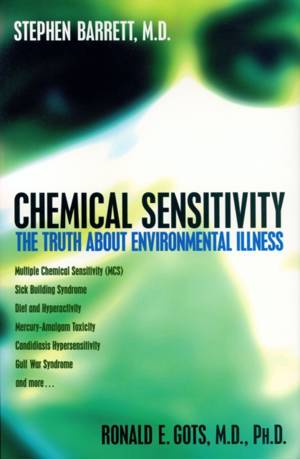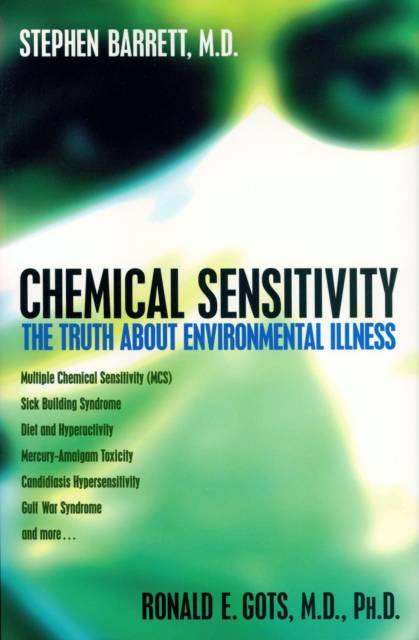
Je cadeautjes zeker op tijd in huis hebben voor de feestdagen? Kom langs in onze winkels en vind het perfecte geschenk!
- Afhalen na 1 uur in een winkel met voorraad
- Gratis thuislevering in België vanaf € 30
- Ruim aanbod met 7 miljoen producten
Je cadeautjes zeker op tijd in huis hebben voor de feestdagen? Kom langs in onze winkels en vind het perfecte geschenk!
- Afhalen na 1 uur in een winkel met voorraad
- Gratis thuislevering in België vanaf € 30
- Ruim aanbod met 7 miljoen producten
Zoeken
Chemical Sensitivity
The Truth about Environmental Illness
Stephan J Barrett, Ronald Gots
Hardcover | Engels
€ 47,95
+ 95 punten
Omschrijving
Chemical sensitivity (or "multiple chemical sensitivity") describes people with numerous troubling symptoms attributed to environmental factors, from simple housepaint to complex building structures and materials in offices and schools. Many such people are seeking special accommodations, applying for disability benefits, and filing lawsuits claiming that exposure to common foods and chemicals has made them ill. Their efforts are supported by some physicians who refer themselves as clinical ecologists. They use questionable diagnoses and treatment methods, while critics charge that these approaches are bogus and that "chemical sensitivity" is not a valid diagnosis.The complaints associated with chemical sensitivity include depression, irritability, poor memory, fatigue, drowsiness, constipation, sneezing, wheezing, skin rashes, headache, chest pain, pounding heart, swelling, upset stomach, paralysis, AIDS-like illnesses, psychotic experiences, and just about every other symptom noted in medical textbooks. One prominent clinical ecologist even claimed that chemical sensitivity patients may well be human "canaries" on an increasingly poisoned planet, and others have actually labeled chemical sensitivity as a disease. While some people are adversely affected by exposure to some chemicals, there is an overwhelming increase in false claims and reports from misled obsessive patients and opportunistic doctors.Chemical Sensitivity examines this phenomenon in depth and the scientific, legal, ethical, and political issues that surround it. The authors explore the speculations about environmental exposure in the light of scientific knowledge of human physiology, allergy and immunology, pathology, toxicology, and clinical medicine. They evaluate cases of chemical sensitivity relative to controlled tests, and reveal that symptoms were brought on by psychological factors rather than physical ones. Chemical Sensitivity also critically assesses claims related to "sick building syndrome," "mercury-amalgam toxicity," "yeast allergy," and Gulf War syndrome.
Specificaties
Betrokkenen
- Auteur(s):
- Uitgeverij:
Inhoud
- Aantal bladzijden:
- 212
- Taal:
- Engels
Eigenschappen
- Productcode (EAN):
- 9781573921954
- Verschijningsdatum:
- 1/04/1998
- Uitvoering:
- Hardcover
- Formaat:
- Genaaid
- Afmetingen:
- 159 mm x 236 mm
- Gewicht:
- 467 g

Alleen bij Standaard Boekhandel
+ 95 punten op je klantenkaart van Standaard Boekhandel
Beoordelingen
We publiceren alleen reviews die voldoen aan de voorwaarden voor reviews. Bekijk onze voorwaarden voor reviews.









